446 scholarly books by Seagull Books and 9
have author last names that start with V
446 scholarly books by Seagull Books and 9
446 scholarly books by Seagull Books
9 have author last names that start with V have author last names that start with V
9 have author last names that start with V have author last names that start with V
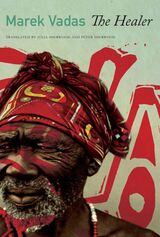
The Healer
Marek Vadas
Seagull Books, 2023
Traditional African narrative forms combined with European modernism.
The stories comprising The Healer, Marek Vadas’s first collection, which was originally published in 2006, are steeped in the culture, rituals, and traditions of Africa, blurring the boundaries between dream and reality and peopled with characters whose gender, shape, skin color or even memories may change at a stroke. Nevertheless, Vadas refuses to exoticize this world, and many of the stories, told in pared-down language, blend mythical elements with realistic depictions of harsh living conditions, economic deprivation, and colonial oppression. The narratives unfold from the perspective of their protagonists—children (often orphaned), and men struggling to make ends meet and trying in vain to resist the allure of strong women endowed with magic powers. As a Slovak writer focusing on the African continent, Vadas is a rare voice that helps to build bridges between very different cultures, and now his writing is introduced to the global anglophone readership.
The stories comprising The Healer, Marek Vadas’s first collection, which was originally published in 2006, are steeped in the culture, rituals, and traditions of Africa, blurring the boundaries between dream and reality and peopled with characters whose gender, shape, skin color or even memories may change at a stroke. Nevertheless, Vadas refuses to exoticize this world, and many of the stories, told in pared-down language, blend mythical elements with realistic depictions of harsh living conditions, economic deprivation, and colonial oppression. The narratives unfold from the perspective of their protagonists—children (often orphaned), and men struggling to make ends meet and trying in vain to resist the allure of strong women endowed with magic powers. As a Slovak writer focusing on the African continent, Vadas is a rare voice that helps to build bridges between very different cultures, and now his writing is introduced to the global anglophone readership.
[more]

I Just Let Life Rain Down on Me
Selected Letters and Reflections
Rahel Levin Varnhagen
Seagull Books, 2024
A personal look into the mind of one of Europe’s first and foremost women of letters.
At times poetic but not a poem, prosaic but not an essay, a letter is often pure writing for writing’s sake. Such is the case for Rahel Varnhagen von Ense, née Levin, the illustrious German-Jewish Berlin literary salon hostess from the early nineteenth century. She penned over ten thousand letters to more than three hundred recipients, including princes, philosophers, poets, family members, and the family cook. Written with a wink at posterity, collected and first published after her passing by her husband, Karl August Varnhagen von Ense, these letters constitute a singular contribution to German literature.
Varied in subject—from family affairs to linguistic, literary, and pressing social concerns—the poignant lyricism of her letters is all the more remarkable when we take into account that High German was not her first language; she grew up speaking, reading, and writing primarily Yiddish. Her shaky social status as a woman and a member of a precarious minority, combined with an astounding lucidity and a rare capacity to put her thoughts into words, made her a force to be reckoned with in her lifetime and thereafter as one of Germany’s preeminent women of letters. As we see in I Just Let Life Rain Down on Me, her voice is as fresh and original as that of any of the recognized poets and thinkers of her day. As Rahel herself put it: “[O]ur language is our lived life; I invented mine for my own purposes, I was less able than many others to make use of preconceived turns of phrase, which is why mine are often clumsy, and in all respects faulty, but always true.”
Compiled and translated by Peter Wortsman, this rewarding volume affords English-speaking readers the first privileged peek at the mindset of one of Europe’s first and foremost women of letters.
At times poetic but not a poem, prosaic but not an essay, a letter is often pure writing for writing’s sake. Such is the case for Rahel Varnhagen von Ense, née Levin, the illustrious German-Jewish Berlin literary salon hostess from the early nineteenth century. She penned over ten thousand letters to more than three hundred recipients, including princes, philosophers, poets, family members, and the family cook. Written with a wink at posterity, collected and first published after her passing by her husband, Karl August Varnhagen von Ense, these letters constitute a singular contribution to German literature.
Varied in subject—from family affairs to linguistic, literary, and pressing social concerns—the poignant lyricism of her letters is all the more remarkable when we take into account that High German was not her first language; she grew up speaking, reading, and writing primarily Yiddish. Her shaky social status as a woman and a member of a precarious minority, combined with an astounding lucidity and a rare capacity to put her thoughts into words, made her a force to be reckoned with in her lifetime and thereafter as one of Germany’s preeminent women of letters. As we see in I Just Let Life Rain Down on Me, her voice is as fresh and original as that of any of the recognized poets and thinkers of her day. As Rahel herself put it: “[O]ur language is our lived life; I invented mine for my own purposes, I was less able than many others to make use of preconceived turns of phrase, which is why mine are often clumsy, and in all respects faulty, but always true.”
Compiled and translated by Peter Wortsman, this rewarding volume affords English-speaking readers the first privileged peek at the mindset of one of Europe’s first and foremost women of letters.
[more]
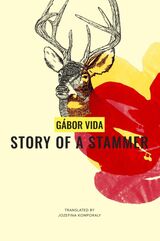
Story of a Stammer
Gábor Vida
Seagull Books, 2022
A novel of growing up a Hungarian in Romania under Communism.
In the novel Story of a Stammer, Gábor Vida asks a fundamental question: Where does stammering come from? In the process of answering this question, he discovers that an entire historical period and an entire world have been stammering, too. Through Vida’s eyes, we see that stammering comprises all the lies accumulated over time and over generations because nobody had ever articulated what they felt or thought, nor done what they really wanted. Nobody, Vida shows, had ever told the truth.
Describing life in the 1970s and ’80s under Romanian Communist dictator Nicolae Ceauçescu’s authoritarian regime, Vida writes with disarming honesty, breaking taboos and chronicling the ways in which tyranny and exploitation seep into family relationships. The novel charts the first two decades of a young Hungarian man’s life in Romania, telling a story of coming to terms with a stammer, loneliness, and an unstimulating environment where religion, alcoholism, and suicide are the most common escape strategies. A Bildungsroman, a novel about Transylvania, a chronicle of minority life, a sociological analysis of cultural identity, and ultimately a deeply personal account of a historical era, Story of a Stammer is a major contribution to contemporary Hungarian literature—an unfailingly serious yet humorously delightful witness to a turbulent period in recent history.
In the novel Story of a Stammer, Gábor Vida asks a fundamental question: Where does stammering come from? In the process of answering this question, he discovers that an entire historical period and an entire world have been stammering, too. Through Vida’s eyes, we see that stammering comprises all the lies accumulated over time and over generations because nobody had ever articulated what they felt or thought, nor done what they really wanted. Nobody, Vida shows, had ever told the truth.
Describing life in the 1970s and ’80s under Romanian Communist dictator Nicolae Ceauçescu’s authoritarian regime, Vida writes with disarming honesty, breaking taboos and chronicling the ways in which tyranny and exploitation seep into family relationships. The novel charts the first two decades of a young Hungarian man’s life in Romania, telling a story of coming to terms with a stammer, loneliness, and an unstimulating environment where religion, alcoholism, and suicide are the most common escape strategies. A Bildungsroman, a novel about Transylvania, a chronicle of minority life, a sociological analysis of cultural identity, and ultimately a deeply personal account of a historical era, Story of a Stammer is a major contribution to contemporary Hungarian literature—an unfailingly serious yet humorously delightful witness to a turbulent period in recent history.
[more]
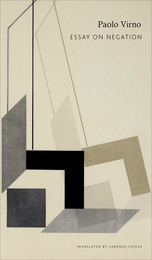
An Essay on Negation
For a Linguistic Anthropology
Paolo Virno
Seagull Books, 2018
A vital addition to Seagull’s growing Italian List that focuses on leftist Italian thought, bringing famous as well as little-known yet crucial voices into the English language.
As speaking animals, we continuously make use of an unassuming grammatical particle, without suspecting that what is at work in its inconspicuousness is a powerful apparatus, which orchestrates language, signification, and the world at large. What particle might this be? The word not.
In Essay on Negation, Paolo Virno argues that the importance of the not is perhaps comparable only to that of money—that is, the universality of exchange. Negation is what separates verbal thought from silent cognitive operations, such as feelings and mental images. Speaking about what is not happening here and now, or about properties that are not referable to a given object, the human animal deactivates its original neuronal empathy, which is prelinguistic; it distances itself from the prescriptions of its own instinctual endowment and accesses a higher sociality, negotiated and unstable, which establishes the public sphere. In fact, the speaking animal soon learns that the negative statement does not amount to the linguistic double of unpleasant realities or destructive emotions: while it rejects them, negation also names them and thus includes them in social life. Virno sees negation as a crucial effect of civilization, one that is, however, also always exposed to further regressions. Taking his cue from a humble word, the author is capable of unfolding the unexpected phenomenology of the negating consciousness.
As speaking animals, we continuously make use of an unassuming grammatical particle, without suspecting that what is at work in its inconspicuousness is a powerful apparatus, which orchestrates language, signification, and the world at large. What particle might this be? The word not.
In Essay on Negation, Paolo Virno argues that the importance of the not is perhaps comparable only to that of money—that is, the universality of exchange. Negation is what separates verbal thought from silent cognitive operations, such as feelings and mental images. Speaking about what is not happening here and now, or about properties that are not referable to a given object, the human animal deactivates its original neuronal empathy, which is prelinguistic; it distances itself from the prescriptions of its own instinctual endowment and accesses a higher sociality, negotiated and unstable, which establishes the public sphere. In fact, the speaking animal soon learns that the negative statement does not amount to the linguistic double of unpleasant realities or destructive emotions: while it rejects them, negation also names them and thus includes them in social life. Virno sees negation as a crucial effect of civilization, one that is, however, also always exposed to further regressions. Taking his cue from a humble word, the author is capable of unfolding the unexpected phenomenology of the negating consciousness.
[more]
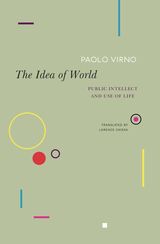
The Idea of World
Public Intellect and Use of Life
Paolo Virno
Seagull Books, 2022
A philosophical exploration of what capitalistic societies truly mean for the individual.
A short vade mecum for unrepentant materialism, The Idea of World collects three essays by Italian philosopher Paulo Virno that are intricately wrapped around one another. The first essay, “Mundanity,” tries to clarify what the term “world,” as referred to as the perceptual and historical context of our existence, means—both with and against Kant and Wittgenstein. How should we understand expressions such as “worldly people,” “the course of the world,” or “getting by in this world”? The second, “Virtuosity and Revolution,” is a minor political treatise. Virno puts forward a set of concepts capable of confronting the magnetic storm that has knocked out the compasses that every reflection on the public sphere has relied on since the seventeenth century. The third, “The Use of Life”, is the shorthand delineation of a research program on the notion of use. What exactly are we doing when we use a hammer, a time span, or an ironic sentence? And, above all, what does the use of the self—of one’s own life, which lies at the basis of all uses—amount to in human existence?
Presenting his ideas in three distinct vignettes, Virno examines how the philosophy of language, anthropology, and political theory are inextricably linked.
A short vade mecum for unrepentant materialism, The Idea of World collects three essays by Italian philosopher Paulo Virno that are intricately wrapped around one another. The first essay, “Mundanity,” tries to clarify what the term “world,” as referred to as the perceptual and historical context of our existence, means—both with and against Kant and Wittgenstein. How should we understand expressions such as “worldly people,” “the course of the world,” or “getting by in this world”? The second, “Virtuosity and Revolution,” is a minor political treatise. Virno puts forward a set of concepts capable of confronting the magnetic storm that has knocked out the compasses that every reflection on the public sphere has relied on since the seventeenth century. The third, “The Use of Life”, is the shorthand delineation of a research program on the notion of use. What exactly are we doing when we use a hammer, a time span, or an ironic sentence? And, above all, what does the use of the self—of one’s own life, which lies at the basis of all uses—amount to in human existence?
Presenting his ideas in three distinct vignettes, Virno examines how the philosophy of language, anthropology, and political theory are inextricably linked.
[more]
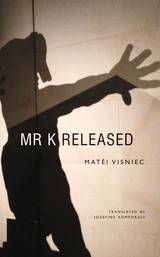
Mr. K Released
Matéi Visniec
Seagull Books, 2019
Mirroring Romania’s drastic transition from totalitarianism to Western-style freedom in the late 1980s, Mr. K Released captures the disturbingly surreal feeling that many newly liberated prisoners face when they leave captivity. Employing his trademark playful absurdity, Matéi Visniec introduces us to Mr. K, a Kafkaesque figure who has been imprisoned for years for an undisclosed crime in a penitentiary with mysterious tunnels.
One day, Mr. K finds himself unexpectedly released. Unable to comprehend his sudden liberation, he becomes traumatized by the realities of freedom—more so than the familiar trauma of captivity or imprisonment. In the hope of obtaining some clarification, Mr. K keeps waiting for an appointment with the prison governor, however, their meeting is constantly being delayed. During this endless process of waiting, Mr. K gets caught up in a clinical exploration of his physical surroundings. He does not have the courage or indeed inclination to leave, but can move unrestricted within the prison compound, charting endless series of absurd circles in which readers might paradoxically recognize themselves.
One day, Mr. K finds himself unexpectedly released. Unable to comprehend his sudden liberation, he becomes traumatized by the realities of freedom—more so than the familiar trauma of captivity or imprisonment. In the hope of obtaining some clarification, Mr. K keeps waiting for an appointment with the prison governor, however, their meeting is constantly being delayed. During this endless process of waiting, Mr. K gets caught up in a clinical exploration of his physical surroundings. He does not have the courage or indeed inclination to leave, but can move unrestricted within the prison compound, charting endless series of absurd circles in which readers might paradoxically recognize themselves.
[more]
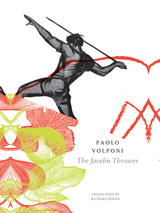
The Javelin Thrower
Paolo Volponi
Seagull Books, 2018
As a boy growing up in rural Italy in the 1930s, Damìn is experiencing the first stirrings of adolescence when he accidentally sees his mother having sex with the local Fascist commandant. His pain, anger, and confusion are uncomfortably intertwined with a compulsion to watch them, which becomes an obsession.
Isolating himself from anyone who might help him understand what he’s feeling, he channels his fury into his javelin, getting better and better until he is a local champion. But his success is fleeting, as wholly confused and caught up in his own anger, he ends up betraying and humiliating his friends. The Javelin Thrower is the story of an erotic education turned tragic, poisoned by the darkness running through Mussolini’s Italy.
Isolating himself from anyone who might help him understand what he’s feeling, he channels his fury into his javelin, getting better and better until he is a local champion. But his success is fleeting, as wholly confused and caught up in his own anger, he ends up betraying and humiliating his friends. The Javelin Thrower is the story of an erotic education turned tragic, poisoned by the darkness running through Mussolini’s Italy.
[more]
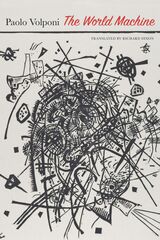
The World Machine
Paolo Volponi
Seagull Books, 2024
A vivid and unforgettable novelistic portrait of rural Italy, exploring the nature of reality and the human condition.
A small-time farmer living in central Italy in the 1960s is the keeper of a great truth: that people are machines built by other beings who are machines themselves. Our true destiny is to build ever better machines so that society can become a techno-utopia in which friendship can be established among all people on earth. These ideas bring him into conflict with everyone, especially his wife, against whom he is accused of ill-treatment. His quest takes him to Rome, where he presents his truth, hoping it will bring him worldwide recognition. Behind his poetical reveries and unfathomable scientific notions lies the disturbing fragility of a lone, paranoid, and deluded man in conflict with everyone, including himself.
Paolo Volponi’s unique novel The World Machine examines the relationship between rural life and the modern city, as well as the subversive idealism of a society still firmly anchored in the past, dominated by the Church, and unable to grasp the need for change.
A small-time farmer living in central Italy in the 1960s is the keeper of a great truth: that people are machines built by other beings who are machines themselves. Our true destiny is to build ever better machines so that society can become a techno-utopia in which friendship can be established among all people on earth. These ideas bring him into conflict with everyone, especially his wife, against whom he is accused of ill-treatment. His quest takes him to Rome, where he presents his truth, hoping it will bring him worldwide recognition. Behind his poetical reveries and unfathomable scientific notions lies the disturbing fragility of a lone, paranoid, and deluded man in conflict with everyone, including himself.
Paolo Volponi’s unique novel The World Machine examines the relationship between rural life and the modern city, as well as the subversive idealism of a society still firmly anchored in the past, dominated by the Church, and unable to grasp the need for change.
[more]

Thomas Mann’s Overcoat
István Vörös
Seagull Books, 2024
This novel seamlessly blends the intellectual musings of Thomas Mann with a Hungarian folktale exploring the boundaries of reality and fantasy.
In this captivating and whimsical novel, the German novelist and critic Thomas Mann is visiting his tailor, Klaus, to be measured for a new overcoat, but his mind is full of thoughts of his new novel and meditations on the state of Europe after World War I. His tailor, though, entraps him in wily dialogue with mysterious claims about angels threading a strand of their hair through all of God’s creations. Mann becomes further entangled with this provocative artisan through a mysterious dream in which he is asked to draft a contract for the Rights of Devils.
At the same time, the impoverished mother of five-year-old Marci Tamás, living in a tiny Hungarian village, struggles to find the little boy a winter coat. Marci has stopped growing, so the coat she finds—belonging to a former circus dwarf—should suffice for life. Only the coat has a life of its own, as Marci soon finds out. That’s not all: he discovers a mysterious little white elephant in the family courtyard, which no one else can see. Determined to save the family’s three piglets from being slaughtered, he enlists this strange creature in a daring collective escape.
Written by one of Hungary’s most audacious literary voices, Thomas Mann’s Overcoat is at once a homage to the great German novelist as well as an Ars Poetica that embraces excess, whimsy, and folk poetry and refuses the strictures of realism.
In this captivating and whimsical novel, the German novelist and critic Thomas Mann is visiting his tailor, Klaus, to be measured for a new overcoat, but his mind is full of thoughts of his new novel and meditations on the state of Europe after World War I. His tailor, though, entraps him in wily dialogue with mysterious claims about angels threading a strand of their hair through all of God’s creations. Mann becomes further entangled with this provocative artisan through a mysterious dream in which he is asked to draft a contract for the Rights of Devils.
At the same time, the impoverished mother of five-year-old Marci Tamás, living in a tiny Hungarian village, struggles to find the little boy a winter coat. Marci has stopped growing, so the coat she finds—belonging to a former circus dwarf—should suffice for life. Only the coat has a life of its own, as Marci soon finds out. That’s not all: he discovers a mysterious little white elephant in the family courtyard, which no one else can see. Determined to save the family’s three piglets from being slaughtered, he enlists this strange creature in a daring collective escape.
Written by one of Hungary’s most audacious literary voices, Thomas Mann’s Overcoat is at once a homage to the great German novelist as well as an Ars Poetica that embraces excess, whimsy, and folk poetry and refuses the strictures of realism.
[more]
READERS
Browse our collection.
PUBLISHERS
See BiblioVault's publisher services.
STUDENT SERVICES
Files for college accessibility offices.
UChicago Accessibility Resources
home | accessibility | search | about | contact us
BiblioVault ® 2001 - 2024
The University of Chicago Press









